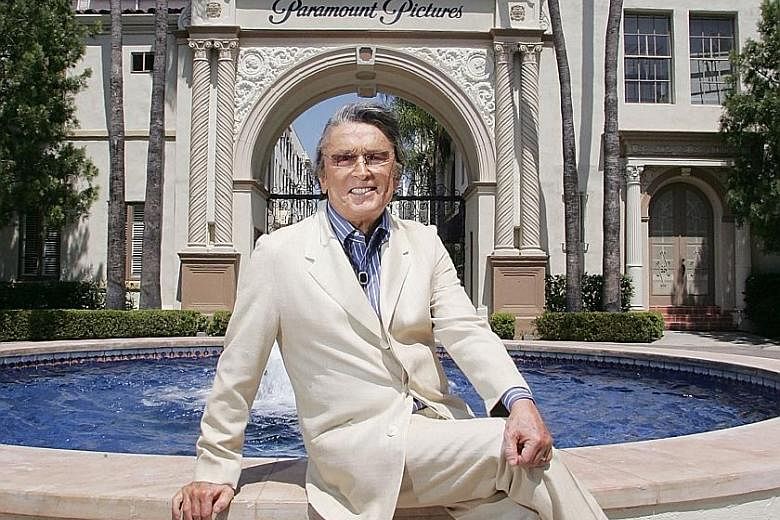NEW YORK • A women's pants salesman comes to Hollywood and jumps into the pool at the Beverly Hills Hotel, drawing the attention of an A-list actress.
With her help, he begins an acting career, which leads quickly to the top job at Paramount Pictures. He helps deliver masterworks such as The Godfather (1972) and Chinatown (1974). A cocaine blizzard, legal spats and financial ruin come next. In the final reel, a comeback.
If a screenwriter had invented American film producer Robert Evans, the script would have been tossed on the rejection pile as too tall a tale.
But Evans, who died last Saturday at his home in Beverly Hills, California, was living proof that, at least in Hollywood, truth can still be stranger than fiction.
In a world full of big lives, he lived one of the biggest: boardroom fights, tabloid romances, tennis with former United States secretary of state Henry Kissinger, even a murder trial.
Evans was 89. His death was confirmed on Monday by a family spokesman, who gave no other details.
His colourful, twisty life made him a show business legend - actor Dustin Hoffman parodied him in the 1997 comedic drama Wag The Dog - but his biggest contribution to the movie industry paradoxically involved substance over style.
When Evans took Paramount's reins in 1966, Hollywood was in creative decline, relying heavily on established stars and safely sellable scripts. Evans helped rewrite the formula for a time by championing young writers and directors with striking cinematic voices.
"We didn't strive for commercial," he told Variety in 2002, undoubtedly in his trademark gurgle-mumble. "We went for original. We fell on our a**es on some of them, but we also touched magic."
It was how the world got Roman Polanski's Rosemary's Baby (1968), Francis Ford Coppola's The Godfather series (1972 to 1990) and Sidney Lumet's Serpico (1973), among others - films that have had an outsize impact on many of the writers, directors, actors, agents and studio executives that have come along since.
When he arrived in Hollywood in 1956, the film industry was still run by its magisterial founders - people such as Darryl F. Zanuck, who, when novelist Ernest Hemingway objected to the casting of Evans as the bullfighter in The Sun Also Rises (1957), barked a response that became famous: "The kid stays in the picture."
Evans borrowed the line as the title for his memoir, which led to a popular documentary of the same name.
But corporate interlopers soon started buying up chunks of Hollywood.
It was one such company, Gulf + Western, that catapulted Evans into moviedom's highest ranks.
After realising in the late 1950s that he lacked the acting talent to become a true star, he took some time off before turning to producing. But before he could make a single film, Gulf + Western hired him in 1966 to run production at Paramount, which was a new acquisition.
By the mid-1970s, Evans had delivered hits such as True Grit (1969), Love Story (1970) and Harold And Maude (1971), and was nominated for an Oscar for producing Chinatown. He hobnobbed with statesmen; Mr Kissinger was by his side at the 1972 premiere of The Godfather.
The music stopped in 1980, when Evans pleaded guilty to cocaine possession, along with his brother, Charles, and his brother-in-law, Michael Shure.
Then came The Cotton Club (1984). Evans was producing the film, a crime drama directed by Coppola, in 1983 when one of its investors, Mr Roy Radin, was murdered.
Evans was never charged with a crime - one of his former girlfriends and three of her associates were eventually convicted in the case - but he emerged a Hollywood pariah.
Time, sobriety and the memoir healed his reputation and Evans returned to producing, retaining a bit of his colourful style. His last movie as a full producer, the 2003 romantic comedy How To Lose A Guy In 10 Days, was a success, taking in about US$251 million worldwide in today's dollars.
Evans was born Robert J. Shapera on June 29, 1930, in Manhattan to Archie and Florence (Krasne) Shapera. His father, who took on the name Evans when Robert was young, according to The Kid Stays In The Picture, was a dentist; his mother was a housewife.
Evans was married and divorced seven times. His survivors include a son, Josh, from his brief marriage to actress Ali MacGraw, who became a star in Love Story. He is also survived by a sister, independent producer Alice Shure.
NYTIMES

